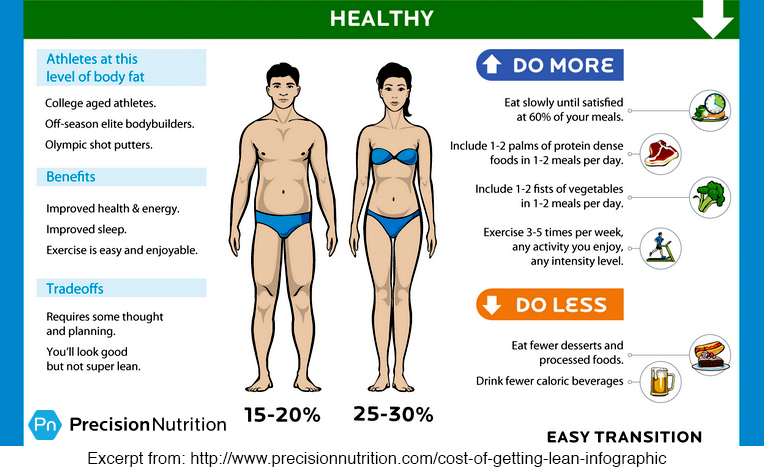I’m interrupting myself–again–to talk about an infographic from a company blog that a friend originally shared on facebook a while ago. I thought I’d use my own thought processes as an example as to how I, versus a trained scientist (e.g., my sister), digested this graphic.
This infographic image is one panel from a series that depicts the subsequent trade-offs that an individual must adhere to in order to gain the body image to which s/he strives. Before even looking at the company that produced the graphic, I read through the first couple of paragraphs (noting its many grammatical errors), and then skimmed through the next few paragraphs to try to get a sense of what the blog was advocating. I ended up believing the blog because at first glance, it seemed to merely imply that with extreme goals (of any kind), there can be adverse consequences, a concept I rabidly support. My initial reactions:
1) What a great graphic! Layout and information structure stay the same to emphasize the difference from one screen to the next. Graphics are devoid of superfluous imagery.
2) Graphic visually correlates the changes in physique with increasing mental, social and physiological demands necessary to achieve that physique.
3) THIS GRAPHIC IS WELL THOUGHT OUT. I APPROVE AND ACCEPT IT AS AUTHORITY.
Then I showed it to my sister, who has a Ph.D. in Nutritional Biochemistry, and here are her initial impressions:
1) The company behind this is a health coaching company, so, there may be a hidden agenda/advocacy behind publishing this graphic.
2) Overall, this graphic series are interesting in its incorporation of the social, psychological and physiological aspects that could impact upon the returns provided by increasing levels of fitness. Will the individual find the trade-offs worth it?
3) Interesting in the holistic approach they present.
A trained scientist is interested in results, but more so, immediately asks more questions about the information presented like: who’s making the claim? What do they gain from publishing these results? Where’s the data? It’s NORMAL to believe what you already believe in, and poo-poo what you don’t.
So, this company is a nutrition/fitness coaching company. Their goal is to help you achieve your fitness goals for a fee. That's where I get a tad suspicious. But what I do appreciate in what they've created is the reality of how multi-factorial physical fitness maintenance is, and further, to possibly make you feel better about why you may not be able to achieve that 6-pack.
Most of all, whereas fitness should not be an optional goal, we don't all have to be elite athletes to be deemed healthy and fit. A healthy lifestyle is ALWAYS a great goal, but a healthy lifestyle ALSO means one that is full of joy and anticipation of doing things we love to do. And if that includes dining with friends and trying new restaurants like it does for me, that's an important consideration that for me is not worth taking off the table for that 6–pack.
This infographic image is one panel from a series that depicts the subsequent trade-offs that an individual must adhere to in order to gain the body image to which s/he strives. Before even looking at the company that produced the graphic, I read through the first couple of paragraphs (noting its many grammatical errors), and then skimmed through the next few paragraphs to try to get a sense of what the blog was advocating. I ended up believing the blog because at first glance, it seemed to merely imply that with extreme goals (of any kind), there can be adverse consequences, a concept I rabidly support. My initial reactions:
1) What a great graphic! Layout and information structure stay the same to emphasize the difference from one screen to the next. Graphics are devoid of superfluous imagery.
2) Graphic visually correlates the changes in physique with increasing mental, social and physiological demands necessary to achieve that physique.
3) THIS GRAPHIC IS WELL THOUGHT OUT. I APPROVE AND ACCEPT IT AS AUTHORITY.
Then I showed it to my sister, who has a Ph.D. in Nutritional Biochemistry, and here are her initial impressions:
1) The company behind this is a health coaching company, so, there may be a hidden agenda/advocacy behind publishing this graphic.
2) Overall, this graphic series are interesting in its incorporation of the social, psychological and physiological aspects that could impact upon the returns provided by increasing levels of fitness. Will the individual find the trade-offs worth it?
3) Interesting in the holistic approach they present.
A trained scientist is interested in results, but more so, immediately asks more questions about the information presented like: who’s making the claim? What do they gain from publishing these results? Where’s the data? It’s NORMAL to believe what you already believe in, and poo-poo what you don’t.
So, this company is a nutrition/fitness coaching company. Their goal is to help you achieve your fitness goals for a fee. That's where I get a tad suspicious. But what I do appreciate in what they've created is the reality of how multi-factorial physical fitness maintenance is, and further, to possibly make you feel better about why you may not be able to achieve that 6-pack.
Most of all, whereas fitness should not be an optional goal, we don't all have to be elite athletes to be deemed healthy and fit. A healthy lifestyle is ALWAYS a great goal, but a healthy lifestyle ALSO means one that is full of joy and anticipation of doing things we love to do. And if that includes dining with friends and trying new restaurants like it does for me, that's an important consideration that for me is not worth taking off the table for that 6–pack.


 RSS Feed
RSS Feed
